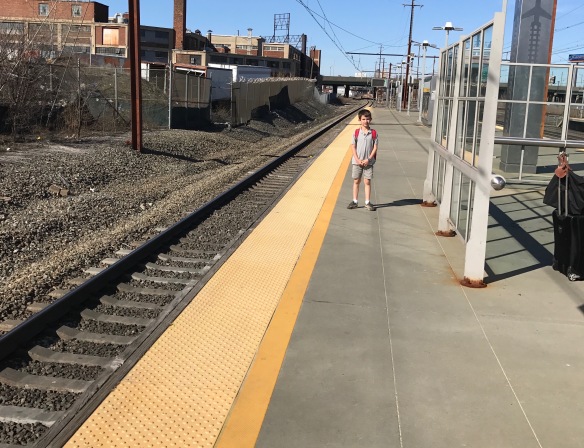 On a recent Wednesday afternoon at LaGuardia, Jay and I sat by our gate and received bad news: Due to a maintenance issue our plane was delayed. I suggested to Jay that we walk and get a sandwich. He wanted to stay by the gate in case the delay was brief. I assured him that maintenance issue meant we had a lot of time.
On a recent Wednesday afternoon at LaGuardia, Jay and I sat by our gate and received bad news: Due to a maintenance issue our plane was delayed. I suggested to Jay that we walk and get a sandwich. He wanted to stay by the gate in case the delay was brief. I assured him that maintenance issue meant we had a lot of time.
The flight we were waiting for was to take us home, at the end of four days traveling together in New York. The reason for the trip was work – I had a mathematician I needed to interview – but that week was also Jay and Wally’s spring break, so I invited Jay along. When I told Wally he was OK with it at first and even expressed how nice it would be for Jay to get to take a trip, but when the morning came for us to leave, he cried deeply, like someone important had been lost to him forever.
This was the first time I’d taken a child on a work trip. I noticed the difference even before I left. On the previous Saturday night as I packed, and afterward as Caroline and I lay in bed talking about the days ahead, I noticed I felt little of the anxiety that usually characterizes nights before a departure.
Our trip proceeded in many stages: a taxi, a flight, a connection, a train, a taxi, a short walk up a hill to our hotel. Along the way I explained such things as I knew, like the difference between the local and the express, and why the boarding door closes ten minutes prior to departure. Over a barbecue buffet in Charlotte between flights, I encouraged Jay to eat up, telling him that when you travel, you have only your body to depend on, so you need to keep it fueled. He seemed to swallow the advice whole.
A month before his eighth birthday, it’s only easy to travel with Jay. When we decamp as a family it’s all about how the kids do in the car and did we remember to pack their goggles; traveling with Jay was like walking with a friend. In four days together I talked to him like his stern dad just once, when I asked him to check the silliness before I left him for a few hours in the company of his young uncle, who I didn’t want to tire of the arrangement too quickly.
And traveling with him, too, changed the feeling of the many ordinary things we did. On the second day, in the late afternoon, we took the train from Princeton to Penn Station. It’s the kind of transit that usually feels dreary, especially at a long hour in the day, but as I sat next to Jay and he looked out the window, it felt like a simmering adventure – like the way I remember feeling on a train car across India with my camping backpack beside me, whole and at-large in the world.
So at the end, when our flight home was delayed, we sat at a bar and shared a pressed sandwich, which Jay pronounced OK, while he kept one eye on the distant gate, and the other on a television playing the last innings of the Yankees game.
While he ate and watched I thought about how these kinds of delays, coming on the last leg of a trip, always put me on edge when I’m traveling alone, yet this time I didn’t feel anxious at all. The reason, I think, is the same reason it’s so easy to nap alongside a sleeping infant: With Jay beside me I could say nearly that my whole life was there, so what was the rush to get anywhere else.


